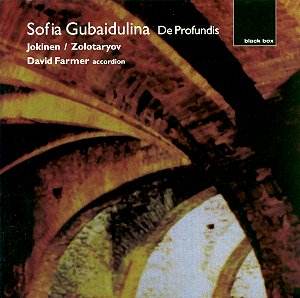It was only in the last quarter of the 20th century
that composers started to take the piano accordion seriously. The perception
was of an Eastern European café instrument or perhaps one associated
with a Parisian garlic seller.
One of the first composers to write seriously for it
came from the unlikely area of North Eastern Siberia, he was Vladislav
Zolotaryov and he had a particular performer in mind, Fredrich Lips.
Consequently despite his short life (he committed suicide) he completed
a large Partita in five movements, three sonatas, six children’s suites
(four of which were edited posthumously by Lips) and two concertos for
accordion. Apparently it was on the strength of his 3rd Sonata
that he was admitted to the Composer’s Union of the Soviet Union in
1974, his position was supported by Sofia Gubaidulina who was to take
over his mantle as a leading Russian composer for the instrument.
I decided to start with Zolotaryov’s Chamber Suite.
This however was a mistake. The piece lacks interest. It consists of
six movements with evocative titles, mostly slow, the liveliest being
the fourth one, "Mysterious Visions". The suite is entirely
diatonic mostly consisting of unmemorable tunes accompanied by simple
rolling quavers. The phrase lengths are 2 or 4 bars invariably immediately
repeated with little or no variation. If these were piano pieces then
the Associated Board might have found them of some use for pupils but
because they are for accordion one feels obliged to judge them differently
but my advice is to quickly move on. It may be that this suite is not
typical of the composer, but the problem is that it does not in any
way move the repertoire on for the instrument. It still feels glued
to its earlier world, stuck in a time-warp represented by the first
part of the century. What was needed to give it a lift was a composer
with more of a vision and imagination.
Erkki Jokinen is the only non-Russian represented here
being a Finn, a pupil and now teacher at the Sibelius Academy. His ‘Alone’
lasts only six minutes and makes its point well. Formally clear and
full of interesting and very surprising sounds it reaches a climax and
suddenly fizzles out, but it certainly attracted and held my attention.
But this is still not great music.
The two large-scale works by Sofia Gubaidulina are
the real draw for this CD and indeed the front of the booklet advertises
‘De Profundis’ to the exclusion of the rest. Certainly her two works
are the star turns both musically and technically for the redoubtable
John Farmer, whom I remember playing to great acclaim at the 1998 Proms,
and for whom I grew in admiration the more I listened to this disc.
Gubaidulina especially makes remarkable demands on the player. He rises
to them superbly and with beautifully musical results every time.
Just before preparing this review I listened again
to her ‘Stimmen…. Verstummen’ Symphony (Chandos CHAN 9183). Her fingerprints
consist of a strong interest in occasional diatonic harmony, a sudden
major chord in the midst of an atonal section; harmonics, cluster-chords
and percussive-type noises. The language remains the same although we
have moved from the symphony orchestra to the accordion. ‘De Profundis’
is a piece about human suffering expressed musically in an opening of
dark shake-clusters in the lowest register, followed by a legato chorale
expressing hope and mercy, a pounding bass passage which reminded me
of the sixth movement of ‘Stimmen…Verstummen’ and a huge anti-climax
with glissando clusters. Heaven is reached at the end with an E major
chord in the same way that in ‘Stimmen…Verstummen’ a D major chord occurs.
Her orchestral work ‘Pro et contra’ (Bis CD668) is
basically a calm piece with an apocalyptic climax after well over thirty
minutes. ‘Et Exspecto’ includes many of the sounds we have come to expect
of the composer plus some new ones like bellows-ricochet, and reaches
its climax formally in a similar place, the fourth of its five movements
with chorale-type chords mostly dissonances of much tension which attaining
their highest point end in a scurrying, toccata passage which winds
its virtuoso way up and then down before fading into nothing.
Notice the religious connotations behind these works.
Gubaidulina transcends the obvious exigencies of the instrument to create
a spiritual journey of fine music, which has something powerful to say,
and which makes an immediate impression.
Recording and notes helpful and clearly presented.
Gary Higginson





 All Nimbus reviews
All Nimbus reviews








